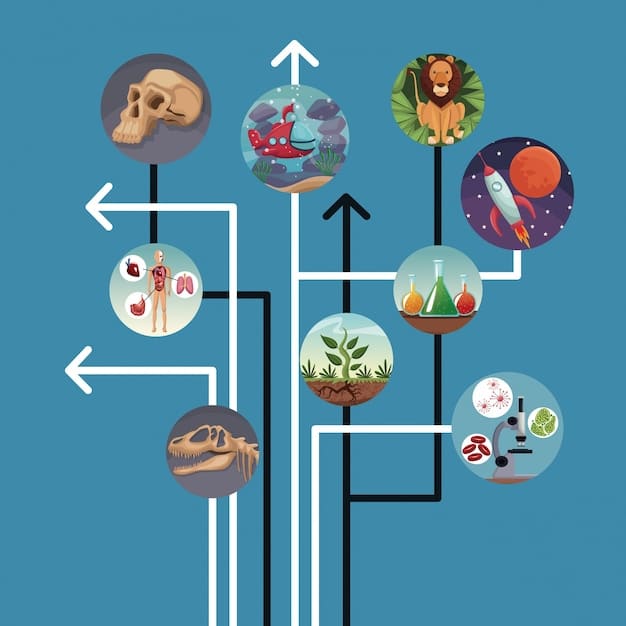Can CBT Really Cut Depression Symptoms by 40%? A Science-Backed Look

Cognitive Behavioral Therapy (CBT) has shown promise in alleviating depression symptoms, with some studies suggesting it can reduce symptoms by up to 40% through structured techniques and a focus on changing negative thought patterns.
Can Cognitive Behavioral Therapy (CBT) Help Reduce Symptoms of Depression by 40%? The answer, backed by scientific research and clinical practice, is a nuanced one that explores both the potential benefits and limitations of this widely used therapeutic approach.
Understanding Cognitive Behavioral Therapy (CBT)
Cognitive Behavioral Therapy (CBT) is a type of psychotherapy that focuses on identifying and changing negative thinking patterns and behaviors. It’s a practical approach used to treat various mental health conditions, including depression. Understanding CBT involves grasping its core principles and how it differs from other types of therapy.
Core Principles of CBT
The foundation of CBT lies in the idea that our thoughts, feelings, and behaviors are interconnected. By altering maladaptive thought patterns, individuals can experience positive changes in their emotions and actions.
How CBT Differs From Other Therapies
Unlike some other forms of therapy that delve into past experiences, CBT is primarily present-focused. It equips individuals with practical skills and strategies to manage their current challenges effectively.
- Focus on the Present: CBT targets current issues rather than dwelling on past traumas.
- Problem-Solving Approach: It emphasizes practical solutions and coping mechanisms.
- Structured Sessions: CBT typically involves a structured format with specific goals and techniques.
- Active Role of the Patient: Patients actively participate in identifying and challenging their thoughts and behaviors.
In essence, CBT is a collaborative and empowering process where individuals learn to become their own therapists, equipped with the tools to manage their mental health proactively.
The Science Behind CBT and Depression
Numerous studies have explored the effectiveness of CBT in treating depression. Scientific evidence supports the idea that CBT can significantly reduce depressive symptoms by addressing the underlying cognitive and behavioral factors contributing to the condition.
Key Studies Highlighting CBT’s Effectiveness
Research consistently demonstrates that CBT is a valuable tool in depression management. Several studies have reported significant reductions in depressive symptoms among individuals undergoing CBT.

How CBT Targets Depression Symptoms
CBT operates by targeting the specific thought patterns and behaviors that perpetuate depression. By disrupting these cycles, individuals can experience relief from their symptoms.
- Identifying Negative Thoughts: CBT helps individuals become aware of their automatic negative thoughts.
- Challenging and Reframing: Patients learn to evaluate the validity of these thoughts and reframe them in a more positive light.
- Behavioral Activation: CBT encourages engagement in enjoyable activities to counteract withdrawal and isolation.
- Developing Coping Skills: Individuals acquire strategies to manage stress and cope with challenging situations.
The scientific rationale behind CBT’s effectiveness lies in its ability to modify the cognitive and behavioral processes that maintain depression. By actively engaging in therapy, individuals can interrupt the cycle of negative thinking and behavior, leading to significant improvements in their mood and overall functioning.
Can CBT Reduce Depression Symptoms by 40%? Examining the Numbers
While CBT is indeed effective, the claim that it can reduce depression symptoms by exactly 40% requires a closer look. The percentage of symptom reduction can vary depending on numerous factors, including the severity of the depression, individual characteristics, and the specific CBT techniques used.
Factors Influencing CBT’s Effectiveness
Several variables can affect the extent to which CBT reduces depression symptoms. Understanding these factors provides a more realistic perspective on the therapy’s potential impact.
What Studies Actually Show About Symptom Reduction
Although some studies may suggest a 40% reduction in depression symptoms, it’s essential to consider the overall range of outcomes reported across different research projects. Studies show varying degrees of effectiveness, highlighting the complexity of treating depression.
- Severity of Depression: Individuals with mild to moderate depression may experience greater symptom reduction compared to those with severe depression.
- Individual Differences: Factors such as personality, coping style, and motivation can influence outcomes.
- Therapist Competence: The skills and expertise of the therapist play a crucial role in the effectiveness of CBT.
- Adherence to Therapy: Consistent attendance and active participation in therapy sessions are essential for success.
While CBT is a valuable tool in depression management, it’s important to approach claims of a specific percentage of symptom reduction with caution. Realistic expectations and an understanding of the factors influencing outcomes are crucial for maximizing the benefits of CBT.
Techniques Used in CBT for Depression
CBT employs a variety of techniques to help individuals manage their depression. These techniques are designed to address negative thought patterns, develop adaptive coping skills, and promote behavioral changes.
Common Cognitive Techniques
Cognitive techniques focus on identifying and modifying maladaptive thought patterns. These techniques are central to the CBT process and empower individuals to challenge their negative thinking.
Behavioral Techniques for Overcoming Depression
Behavioral techniques aim to promote positive changes in behavior. These techniques help individuals break free from the cycle of withdrawal and inactivity often associated with depression.

- Cognitive Restructuring: Identifying and challenging negative thoughts by examining the evidence for and against them.
- Thought Records: Keeping a journal to track automatic negative thoughts and analyze their impact.
- Behavioral Activation: Engaging in pleasurable or meaningful activities to boost mood and energy levels.
- Problem-Solving Skills: Developing strategies to address practical problems that contribute to depression.
These techniques provide individuals with a toolkit of strategies to manage their depression actively. By learning to identify and challenge negative thoughts, engage in positive behaviors, and develop effective coping skills, individuals can take control of their mental health and experience lasting relief.
Combining CBT With Other Treatments
CBT is often used in combination with other treatments, such as medication, to achieve optimal outcomes in depression management. An integrative approach that incorporates multiple modalities can provide comprehensive support and address various aspects of the condition.
The Role of Medication in Depression Treatment
Antidepressant medications can help regulate mood and alleviate symptoms of depression. Combining medication with CBT can provide both immediate relief and long-term coping strategies.
Benefits of an Integrative Approach
Integrating CBT with other treatments can offer a more holistic and personalized approach to depression management. This approach addresses both the biological and psychological aspects of the condition.
- Synergistic Effects: Combining CBT with medication can enhance the overall effectiveness of treatment.
- Comprehensive Support: An integrative approach addresses both the symptoms and underlying causes of depression.
- Personalized Care: Treatment plans can be tailored to meet the unique needs and preferences of each individual.
- Improved Outcomes: Research suggests that combining CBT with other treatments can lead to better long-term outcomes.
The decision to combine CBT with other treatments should be made in consultation with a healthcare professional. An integrative approach that considers both the individual’s specific needs and the available evidence can maximize the benefits of therapy and promote sustained recovery.
Finding a Qualified CBT Therapist
The effectiveness of CBT depends largely on the qualifications and expertise of the therapist. Choosing a therapist who is properly trained and experienced in CBT is essential for maximizing the benefits of therapy.
What to Look For in a Therapist
When seeking a CBT therapist, it’s important to consider their credentials, experience, and areas of specialization. A qualified therapist will have the necessary skills and knowledge to guide you through the CBT process effectively.
Questions to Ask Potential Therapists
Asking potential therapists the right questions can help you assess their suitability and ensure a good fit. It’s important to feel comfortable and confident in your therapist’s ability to support you on your journey to recovery.
- Credentials and Training: Ensure the therapist is licensed and has specific training in CBT.
- Experience: Inquire about their experience in treating depression and related conditions.
- Approach to Therapy: Discuss their approach to CBT and how they tailor treatment to individual needs.
- Fees and Logistics: Clarify their fees, session length, and cancellation policy.
By carefully considering these factors and asking the right questions, you can find a CBT therapist who is well-suited to your needs. A strong therapeutic relationship can significantly enhance the effectiveness of CBT and promote lasting improvements in your mental health.
| Key Point | Brief Description |
|---|---|
| 🧠 CBT Basics | Focuses on changing negative thoughts and behaviors. |
| 📈 Symptom Reduction | Can reduce depression symptoms, but the exact percentage varies. |
| 🛠️ CBT Techniques | Involves cognitive restructuring, behavioral activation, and problem-solving. |
| 🤝 Integrative Approach | Combining CBT with medication enhances effectiveness. |
Frequently Asked Questions (FAQs)
▼
CBT is a form of psychotherapy that focuses on changing negative thought patterns and behaviors to improve mental health. It’s practical, goal-oriented, and used for various mental health conditions.
▼
CBT is highly effective in treating depression by addressing the underlying cognitive and behavioral factors. Studies show significant reductions in depressive symptoms with CBT.
▼
While CBT is effective, it may not be a “cure” for everyone. It equips individuals with coping skills, but ongoing management may be necessary, especially for chronic cases.
▼
A typical CBT session lasts around 50 minutes to an hour. The total duration of treatment varies depending on the individual’s needs and progress.
▼
CBT is generally considered suitable for most individuals with depression. However, the best treatment approach may vary based on individual needs and preferences, potentially combining CBT with other therapies.
Conclusion
In conclusion, while the claim that Cognitive Behavioral Therapy (CBT) can reduce symptoms of depression by 40% might be a generalization, the therapy remains a powerful tool in managing and alleviating depression. Its focus on identifying and changing negative thought patterns and behaviors offers individuals a structured approach to improving their mental well-being. Combined with other treatments, CBT can play a significant role in helping people lead healthier and happier lives.





